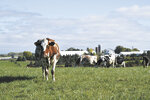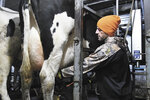


LAKE CITY, Minn. — Some of Jerry Wiebusch’s happiest farm memories, he said, go back to being a kid on the family dairy farm. Today, he works to keep dairy farming the same low-stress experience he knew growing up.
Wiebusch and his sons, Chris and Eric, milk 80 grass-fed, organic cows on 120 acres of pasture at their dairy near Lake City.
The Wiebusches milk twice a day, at 7:30 a.m. and 2:30 p.m. They have been using this timing since upping from milking once a day. They had milked once a day for two and a half years, but the loss of production posed a challenge. Their current practice of twice-a-day milking with different time lengths in between helped them get their production back up while still giving them a good schedule.
“I make everything work,” Wiebusch said. “‘Can’t’ has never been in my vocabulary.”
Wiebusch said their cows are not pushed for production. The farm has a 13,000-pound herd average, and they are content with that. When Wiebusch milked conventionally, his herd had a 20,000-pound herd average in 1987.
Throughout his farming career, Wiebusch has pursued farming practices that create a low-stress experience.
“I don’t chase money,” Wiebusch said. “When you’re younger, you kind of chase money. Once I quit doing that, it opened up a whole different reality.”
Wiebusch began farming in partnership with his dad in 1980 and bought the farm in 1988. He had gone to school to be a carpenter and remembers getting milking done by 7:30 a.m. to get to work, doing carpentry all day and then coming home to milk the cows again and do any other tasks he needed to do.
In 1992, he began considering the grazing movement. Wiebusch said he felt the Holy Spirit telling him to do so.
“For some things, you don’t understand why you go in a different direction in life,” Wiebusch said. “Our life is planned; we can fight it if we want.”
Wiebusch had pushed for high production in the 1980s.
“It just didn’t feel right to me,” he said. “It was stressful. ... Growing up milking cows wasn’t stressful. It was more fun, and I wanted it to be like that.”
When he had a high-production herd, Wiebusch said he felt like the veterinarian was always on the farm and that the stress would wear off on him.
In 1995, Wiebusch began to transition to organic, and in 1998, he started selling milk to Organic Valley.
“I’ve always taken the road least traveled in life,” Wiebusch said. “I don’t like to follow what other people do, and it doesn’t bother me what people say about me or if they want to judge that organic farming isn’t going to work. I’ve proved that wrong to everybody.”
Wiebusch said initially, when he began selling milk organically, the price was lower for organic milk than it was for conventional milk.
“I had seen the swing in the conventional market,” Wiebusch said. “I made the choice to go the organic route. Within a month, the bottom fell out (of conventional milk prices). ... I’ve been riding high ever since.”
In 2006, Chris joined the dairy, and then later, Eric did as well. Today, Chris works full time and Eric helps part time in addition to his other job.
After Wiebusch’s sons joined the dairy, they focused away from grazing for a while and followed more conventional practices while still being organic. However, in 2012, they transitioned to 100% grass fed. Wiebusch said he felt the stress coming back while farming with a more conventional mindset.
Transitioning to grass is the best decision they have made, Wiebusch said. Their milk production has not gone down compared to when he fed grain, and he gets a premium on his milk.
The Wiebusches calve seasonally. In the spring, they calve in March and into May, and in the fall, they calve from August through October. Calves are given unpasteurized whole milk for 90 to 120 days as well as high-quality hay. At 6 to 8 months, they go on pasture.
Animals at the Wiebusch farm are partially bred using A.I. and partially bull bred. All heifers are bred to Angus. The Wiebusches feed out a few of their beef crossbreds for customers.
An average day starts at 7 a.m. for Wiebusch. Chris starts milking at 7:30, and Wiebusch does feeding during that time. Chores are done by 10 a.m.
“This is so relaxing,” Wiebusch said.
Now partially retired, Wiebusch no longer does any milking. In the future, he would like to fully step away.
His sons have bought into Wiebusch’s relaxed, organic vision for the dairy farm.
“They don’t want to expand,” he said. “They just want to keep things just the way they are.”
Comments
No comments on this item Please log in to comment by clicking here